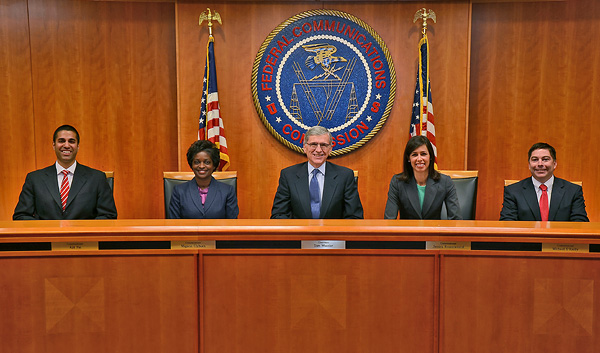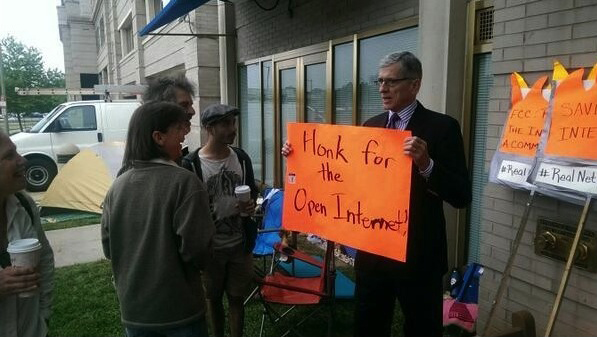FCC's Rules Of The Open Internet Take Effect Today, But For How Long?
Back in February, the FCC was making a lot of noise about Net neutrality and the open Internet. At the time, the FCC voted and approved some new legislation that reclassified Internet service as a telecommunications utility service, and along with it set out rules to structure the fair and open use of the Internet. As of today, this new legislation takes effect, but you might not notice any change, and those changes might only be in effect for a short time.
You shouldn't take my statement that "you might not notice any change" to mean this isn't a major evolution of the inner workings of the Internet. For years now, ISPs have had seemingly unchallenged control over the Internet and have abused this power to violate the privacy of users and take advantage of other services that use the Internet for financial gain.
The rules of the open Internet would bring this to an end, limiting to what extent ISPs can monitor and collect your Internet usage information, and making Internet fast-lanes and blocking of legal services illegal. From this view point, these new rules can almost be seen as the Internet's Bill of Rights.
However, some ISPs refuse to accept these changes and are actively opposing the FCC's legislation in court. The court denied the request of the ISPs to put these changes on hold while the FCC's decision is being contested.
Though it would be illegal for ISPs not to apply these rules to the Internet immediately, the only thing the FCC can do to enforce these changes is to engage in lengthy legal battles. These would eventually be settled, but the ISPs could effectively, then, postpone implementing these changes for years. This is not to mention the fact that the FCC's legislation could ultimately be retracted, and then the ISPs wouldn't need to change anything, and any changes they do make would have only been temporary.
Despite the uncertain future of the Internet, FCC Chairman Tom Wheeler has taken the court's decision to not stay the rules of the Open Internet as a positive. "This is a huge victory for Internet consumers and innovators! Starting Friday, there will be a referee on the field to keep the Internet fast, fair and open. Blocking, throttling, pay-for-priority fast lanes and other efforts to come between consumers and the Internet are now things of the past. The rules also give broadband providers the certainty and economic incentive to build fast and competitive broadband networks," said Wheeler.
If the FCC's open Internet rules are upheld, then the changes to the Internet will profoundly improve user safety and privacy, while also making the Internet more lucrative for businesses and Web services. Until the courts come to a conclusion, however, there is no telling if any of this will actually come to pass.
Get Tom's Hardware's best news and in-depth reviews, straight to your inbox.
Follow Michael Justin Allen Sexton @LordLao74. Follow us @tomshardware, on Facebook and on Google+.
-
davewolfgang Sorry the FCC doesn't have to "power" to "change" the classification of the internet to anything - that takes an Act of Congress - which they haven't done.Reply
The FCC has already been smacked down TWICE by being told they don't have the power NOR authority to do this. They will get smacked down a third time. -
ahnilated Actually the courts have said the FCC DOES have the power to reclassify them and then they do have the power to tell the ISP's what they can do.Reply -
somebodyspecial I don't get the statements here:Reply
" illegal for ISPs not to apply these rules to the Internet immediately"
If that is the case how can you say in the very next few words they can prolong it for years. The courts just said APPLY NOW! So until you WIN a case that says otherwise they are going into effect like it or not for the monopolies in place now. If the court had just said otherwise they could have delayed for years, but that isn't what the court said. They said PUT THEM IN NOW, fight over it if you want, but IN NOW.
Nuff said. Wasted space of an article. -
Achoo22 As a US citizen paying $70/mo for 1mbps DSL (Windstream) that doesn't work evenings, weekends, holidays, business days, rainy days, sunny days, cloudy days, hot days or cold days, I hope this ruling is a gateway to the development of nationwide broadband. The US rolled its sleeves up and ensured Americans had access to telephones and electrical power... now it's time to ensure Americans have access to the Internet. It's too valuable a resource for education, entertainment, and commerce (a typical Amazon.com web-page is now 3MB+ and a 220MB Windows update takes more than an hour of uninterrupted download - only possible during off-hours and nothing else can be done simultaneously, even browsing the web).Reply
I don't care /how/ it gets done, but it is important that quality Internet services be made available to all Americans. And subsidies for ISPs with horrid track records need to end TODAY. If Verizon, for example, promised to wire 100% of NYC with FIOS in exchange for a sweetheart franchise agreement, don't let them off the hook! Put their nuts in a vice for the sake of the citizenry that's getting abused. -
Achoo22 ReplyIf that is the case how can you say in the very next few words they can prolong it for years.
Welcome to 'Murica. The federal government explicitly outlaws marijuana, but that doesn't seem to prevent a whole marijuana industry from thriving - not even directly in the nation's capitol.
The FCC acted at the behest of the President and the corrupt, obstructionist legislative branch will do anything in its power to disrupt any venture the president backs, even if it hurts the citizenry. The author's tone reflects this - even if the order goes forward as of today, there's an overarching feeling that it is a hollow victory and that Internet services will continue to fall short of their potential benefit to our citizens. -
trifler ReplySorry the FCC doesn't have to "power" to "change" the classification of the internet to anything - that takes an Act of Congress - which they haven't done.
The FCC has already been smacked down TWICE by being told they don't have the power NOR authority to do this. They will get smacked down a third time.
Davewolfgang, unless you're top management at an ISP, there is no reason why you wouldn't want the FCC to do this. Open Internet rules are good for everyone. -
none12345 "Sorry the FCC doesn't have to "power" to "change" the classification of the internet to anything - that takes an Act of Congress - which they haven't done.Reply
The FCC has already been smacked down TWICE by being told they don't have the power NOR authority to do this. They will get smacked down a third time. "
Actually the courts ruled that unless they classified the IPSs as a common carrier they did not have the authority to enforce the rules they wanted. They did however have the authority to classifiy the IPSs as common carriers.
So, after trying to get the IPSs to play nice without success, their only option was to reclassify them as common carriers. That gave them the legal authority to enforce their rules.
A bit of data is a bit of data, it should not matter where it came from nor where it goes. My bit is just as import as someone elses bit. Im all for anything that enforces that sentiment. -
somebodyspecial Reply16043020 said:As a US citizen paying $70/mo for 1mbps DSL (Windstream) that doesn't work evenings, weekends, holidays, business days, rainy days, sunny days, cloudy days, hot days or cold days, I hope this ruling is a gateway to the development of nationwide broadband. The US rolled its sleeves up and ensured Americans had access to telephones and electrical power... now it's time to ensure Americans have access to the Internet. It's too valuable a resource for education, entertainment, and commerce (a typical Amazon.com web-page is now 3MB+ and a 220MB Windows update takes more than an hour of uninterrupted download - only possible during off-hours and nothing else can be done simultaneously, even browsing the web).
I don't care /how/ it gets done, but it is important that quality Internet services be made available to all Americans. And subsidies for ISPs with horrid track records need to end TODAY. If Verizon, for example, promised to wire 100% of NYC with FIOS in exchange for a sweetheart franchise agreement, don't let them off the hook! Put their nuts in a vice for the sake of the citizenry that's getting abused.
Agree with everything, except I think you GET the subsidy AFTER your work is complete and proven working :) Nothing up front. PERIOD. They have the money to keep thumping 40Billion buyouts, they can afford to do the $20B they said would upgrade all of USA. No handout until you DO THE WORK YOU PROMISED first.
Bring on municipalities, google, and everyone else that wants to compete to give me cheaper Gbps...LOL.

